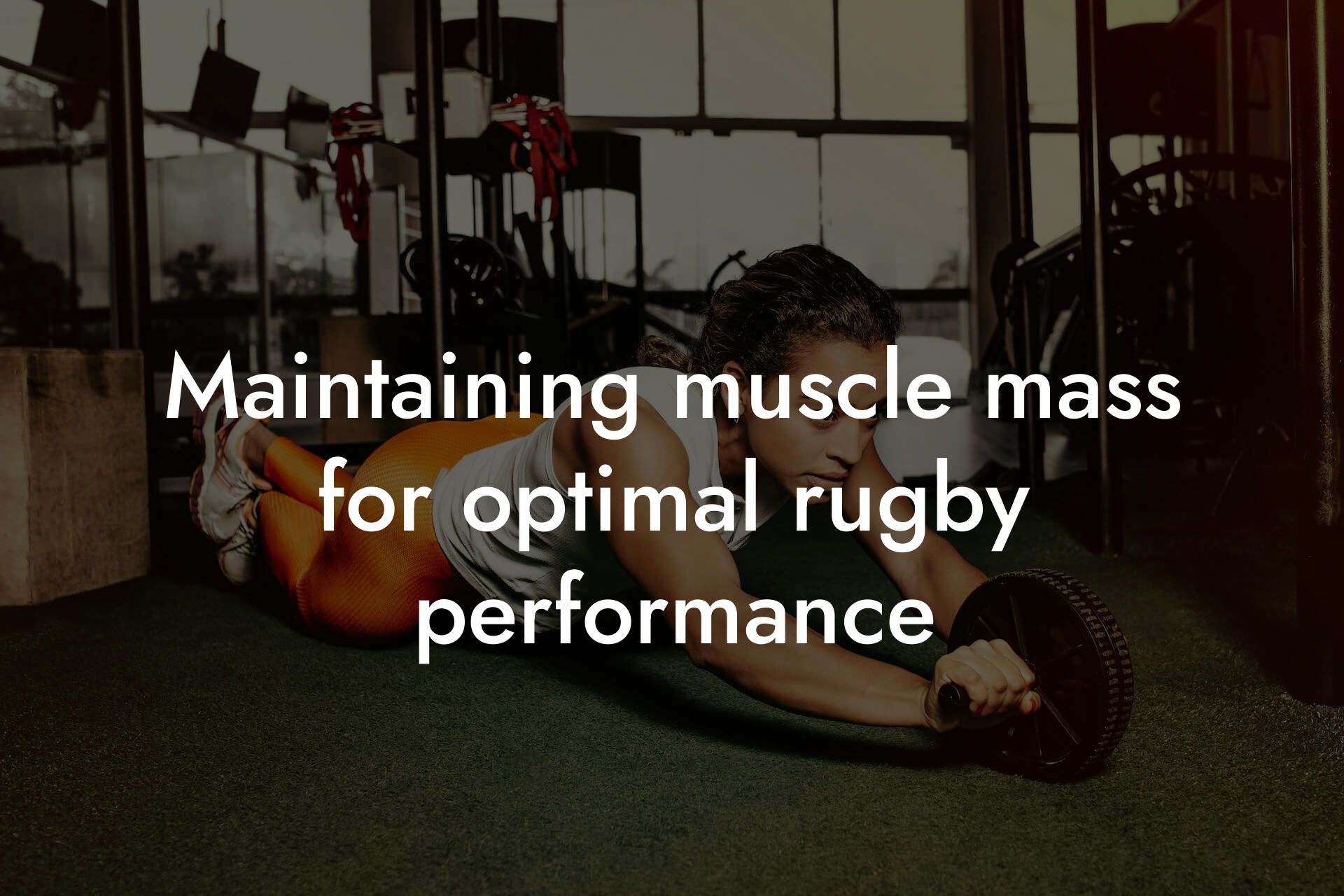Rugby is a physically demanding sport that requires a combination of strength, power, speed, and endurance. To perform at their best, rugby players need to fuel their bodies with the right nutrients to sustain energy levels throughout the match. A well-planned nutrition strategy can make all the difference in a player's performance, helping them to stay focused, energized, and competitive from start to finish.
Table of Contents
Understanding Energy Systems
Before we dive into nutrition strategies, it's essential to understand the energy systems used during rugby. There are three main energy systems: the phosphocreatine (PCr) system, the anaerobic glycolytic system, and the aerobic system. The PCr system provides energy for short, high-intensity efforts, such as sprinting or tackling. The anaerobic glycolytic system is used for medium-duration, high-intensity efforts, like repeated sprints or scrums. The aerobic system is responsible for providing energy for low-to-moderate intensity efforts over a longer duration, such as jogging or jogging with the ball.
Macronutrient Requirements
Rugby players require a balanced diet that includes adequate amounts of carbohydrates, protein, and fat to support energy production and recovery. Carbohydrates are the primary source of energy for rugby players, providing fuel for the anaerobic and aerobic energy systems. Aim to consume 3-5 grams of carbohydrates per kilogram of body weight daily. Good sources of carbohydrates include whole grains, fruits, and vegetables.
Protein is essential for muscle repair and recovery. Rugby players require 1.6-2.2 grams of protein per kilogram of body weight daily. Good sources of protein include lean meats, fish, eggs, dairy, and plant-based options like beans and lentils. Fat is also an important energy source, particularly for low-intensity efforts. Aim to consume 0.5-1 gram of fat per kilogram of body weight daily. Good sources of fat include nuts, seeds, avocados, and olive oil.
Hydration and Electrolytes
Adequate hydration is critical for rugby players, as even mild dehydration can impair performance. Aim to drink at least 8-10 glasses of water per day, and make sure to drink water during and after training sessions and matches. Electrolytes, such as sodium, potassium, and magnesium, are also essential for maintaining proper hydration and nerve function. Include electrolyte-rich foods like bananas, dates, and coconut water in your diet.
Pre-Match Nutrition
The goal of pre-match nutrition is to top off energy stores, prevent dehydration, and optimize digestion. Aim to consume a balanced meal 2-3 hours before the match, including carbohydrates, protein, and healthy fats. Good options include oatmeal with banana and honey, whole-grain toast with avocado and eggs, or grilled chicken with sweet potato and vegetables. Avoid heavy meals, spicy or fatty foods, and caffeine, which can cause digestive discomfort and impair performance.
Half-Time Nutrition
During half-time, focus on replenishing energy stores and rehydrating. Consume a mix of carbohydrates and electrolytes, such as sports drinks, fruit, or energy bars. Aim to consume 20-30 grams of carbohydrates and 150-300 milligrams of sodium. Avoid heavy meals or foods that are difficult to digest, as this can cause discomfort during the second half.
Post-Match Nutrition
After the match, focus on replenishing energy stores, repairing muscle damage, and rehydrating. Consume a mix of carbohydrates and protein within 30-60 minutes after the match, such as a protein shake with fruit or a meal with whole grains, lean protein, and vegetables. Aim to consume 20-30 grams of carbohydrates and 15-20 grams of protein. Continue to rehydrate with water and electrolyte-rich beverages, and avoid heavy meals or foods that are difficult to digest.
Supplements and Ergogenic Aids
While a well-planned diet is essential for sustaining energy during rugby matches, some supplements and ergogenic aids can provide an additional performance boost. Creatine supplementation has been shown to improve muscle strength, power, and endurance. Beta-alanine supplementation can increase muscle carnosine levels, delaying the onset of fatigue. Caffeine can improve alertness, focus, and endurance, but be cautious not to overconsume, as it can cause negative side effects. Consult with a sports dietitian or healthcare professional before adding any supplements to your regimen.
Individualized Nutrition Planning
Every rugby player is unique, with different nutritional needs based on their position, body composition, and training regimen. A DEXA scan can provide valuable information on body fat percentage, lean mass, and bone density, helping to inform nutrition and training decisions. Consult with a sports dietitian or healthcare professional to develop a personalized nutrition plan tailored to your specific needs and goals.
By following these nutrition strategies, rugby players can optimize their energy levels, improve performance, and gain a competitive edge on the pitch. Remember to stay hydrated, fuel your body with a balanced diet, and listen to your body's nutritional needs to perform at your best.
Frequently Asked Questions
What is the importance of nutrition in rugby performance?
Nutrition plays a critical role in rugby performance as it provides the necessary fuel for energy production, supports muscle function, and aids in recovery. A well-planned nutrition strategy can help rugby players optimize their performance, reduce the risk of injury, and enhance their overall physical and mental well-being.
What are the key nutrients required for rugby performance?
The key nutrients required for rugby performance include carbohydrates, protein, healthy fats, vitamins, and minerals. Carbohydrates provide energy, protein supports muscle function and repair, healthy fats support hormone production, and vitamins and minerals support various bodily functions.
How can I ensure I'm consuming enough carbohydrates for rugby?
To ensure you're consuming enough carbohydrates for rugby, focus on whole, complex sources such as whole grains, fruits, and vegetables. Aim to consume 2-3 grams of carbohydrates per kilogram of body weight daily, and prioritize carbohydrate intake in the 24-48 hours leading up to a match.
What is the role of protein in rugby performance?
Protein is essential for muscle function, repair, and recovery in rugby. Aim to consume 1.2-1.6 grams of protein per kilogram of body weight daily, and prioritize protein intake within 30-60 minutes after exercise to support muscle recovery.
How can I stay hydrated during a rugby match?
To stay hydrated during a rugby match, aim to drink 500-750ml of water or a sports drink 2-3 hours before the match, and 150-300ml every 10-15 minutes during the match. Additionally, monitor your urine color and adjust your hydration strategy accordingly.
What are the benefits of a pre-match meal?
A pre-match meal can help top off energy stores, support hydration, and provide essential nutrients for performance. Aim to consume a balanced meal 2-3 hours before the match, including complex carbohydrates, lean protein, and healthy fats.
What are some examples of pre-match meal options?
Examples of pre-match meal options include oatmeal with banana and honey, whole-grain toast with avocado and eggs, or grilled chicken with sweet potato and vegetables. Aim to choose meals that are familiar, easy to digest, and provide a balance of nutrients.
How can I manage my energy levels during a rugby match?
To manage your energy levels during a rugby match, focus on consuming small amounts of carbohydrates and electrolytes during the match, and prioritize hydration. Additionally, aim to pace yourself during the match, taking regular breaks to rest and recover.
What are the benefits of a post-match meal?
A post-match meal can help promote recovery, support muscle repair, and replenish energy stores. Aim to consume a balanced meal or snack within 30-60 minutes after the match, including carbohydrates, protein, and healthy fats.
What are some examples of post-match meal options?
Examples of post-match meal options include a protein shake with fruit, a turkey and avocado wrap, or a bowl of chicken noodle soup. Aim to choose meals that are high in carbohydrates and protein, and easy to digest.
How can I support my immune system during the rugby season?
To support your immune system during the rugby season, focus on consuming a balanced diet rich in fruits, vegetables, whole grains, and lean protein sources. Additionally, prioritize sleep, stress management, and regular exercise to support immune function.
What are some common nutrition mistakes rugby players make?
Common nutrition mistakes rugby players make include inadequate carbohydrate intake, poor hydration, and insufficient protein consumption. Additionally, failing to plan and prepare meals, and relying on convenient or processed foods can also hinder performance.
How can I individualize my nutrition plan for rugby?
To individualize your nutrition plan for rugby, consider your position, playing style, and personal preferences. Work with a sports dietitian or nutritionist to develop a customized plan that meets your unique needs and goals.
What is the role of electrolytes in rugby performance?
Electrolytes, such as sodium, potassium, and magnesium, play a critical role in rugby performance by regulating fluid balance, nerve function, and muscle contractions. Aim to consume electrolyte-rich foods and beverages, such as bananas, avocados, and sports drinks, to support performance.
How can I manage my body weight during the rugby season?
To manage your body weight during the rugby season, focus on maintaining a balanced diet, staying hydrated, and prioritizing regular exercise and strength training. Avoid extreme weight loss or gain, and work with a sports dietitian or nutritionist to develop a personalized plan.
What are some healthy snack options for rugby players?
Healthy snack options for rugby players include fruits, nuts, energy bars, and sandwiches. Aim to choose snacks that are high in carbohydrates, protein, and healthy fats, and low in added sugars, salt, and unhealthy fats.
How can I stay energized during long rugby tournaments?
To stay energized during long rugby tournaments, focus on consuming regular meals and snacks, staying hydrated, and prioritizing rest and recovery. Aim to consume a balanced diet rich in complex carbohydrates, lean protein, and healthy fats, and avoid heavy or greasy foods.
What are some common nutrition myths in rugby?
Common nutrition myths in rugby include the idea that carbohydrates are bad for performance, protein is only necessary for muscle building, and fat is unhealthy. Aim to focus on evidence-based nutrition information and consult with a sports dietitian or nutritionist to develop a personalized plan.
How can I support my bone health during the rugby season?
To support your bone health during the rugby season, focus on consuming a diet rich in calcium, vitamin D, and other essential nutrients. Additionally, prioritize regular exercise, including weight-bearing and resistance training, to support bone density.
What are some healthy hydration options for rugby players?
Healthy hydration options for rugby players include water, sports drinks, and coconut water. Aim to choose beverages that are low in added sugars, salt, and unhealthy fats, and prioritize hydration before, during, and after exercise.
How can I manage my nutrition during away games and travel?
To manage your nutrition during away games and travel, focus on packing healthy snacks, researching local restaurants and grocery stores, and prioritizing room service or meal delivery options that meet your nutrition needs.
What are some common nutrition challenges faced by rugby players?
Common nutrition challenges faced by rugby players include managing energy levels, staying hydrated, and supporting muscle recovery. Additionally, balancing nutrition needs with social and cultural demands, and managing nutrition during travel and away games can also be challenging.
How can I work with a sports dietitian or nutritionist to develop a personalized nutrition plan?
To work with a sports dietitian or nutritionist to develop a personalized nutrition plan, schedule a consultation, provide detailed information about your nutrition needs and goals, and be open to feedback and guidance. Aim to work with a qualified professional who has experience working with rugby players.
Here are some related articles you might love...
- Strength training programs for amateur rugby players
- Using DEXA scans to optimize rugby training
- Maintaining muscle mass for optimal rugby performance
- How to optimize endurance and power in rugby
- The role of body composition in rugby performance
- Recovery strategies for rugby athletes after matches
- Reducing body fat for better agility and power in rugby
- Off-season conditioning for amateur rugby players
- Bone density and injury prevention in rugby
Zak Faulkner
Zak Faulkner is a leading authority in the realm of physical health and body composition analysis, with over 15 years of experience helping professionals optimise their fitness and well-being. As one the experts behind Tano Performance Group, Zak has dedicated his career to providing in-depth, science-backed insights that empower clients to elevate their physical performance and overall health.
With extensive knowledge of DEXA technology, Zak specializes in delivering comprehensive body assessments that offer precise data on body fat, muscle mass, bone density, and overall physique. His expertise enables individuals to make informed decisions and achieve their fitness goals with accuracy and confidence. Zak’s approach is rooted in a deep understanding of human physiology, combined with a passion for helping clients unlock their full potential through personalised strategies.
Over the years, Zak has earned a reputation for his commitment to excellence, precision, and client-focused service. His guidance is trusted by top professionals who demand the best when it comes to their health. Whether advising on fitness programs, nutritional strategies, or long-term wellness plans, Zak Faulkner’s insights are a valuable resource for anyone serious about taking their health and fitness to the next level.
At Tano Performance Group, Zak continues to lead our Content Team revolutionising how professionals approach their physical health, offering unparalleled expertise that drives real results.




